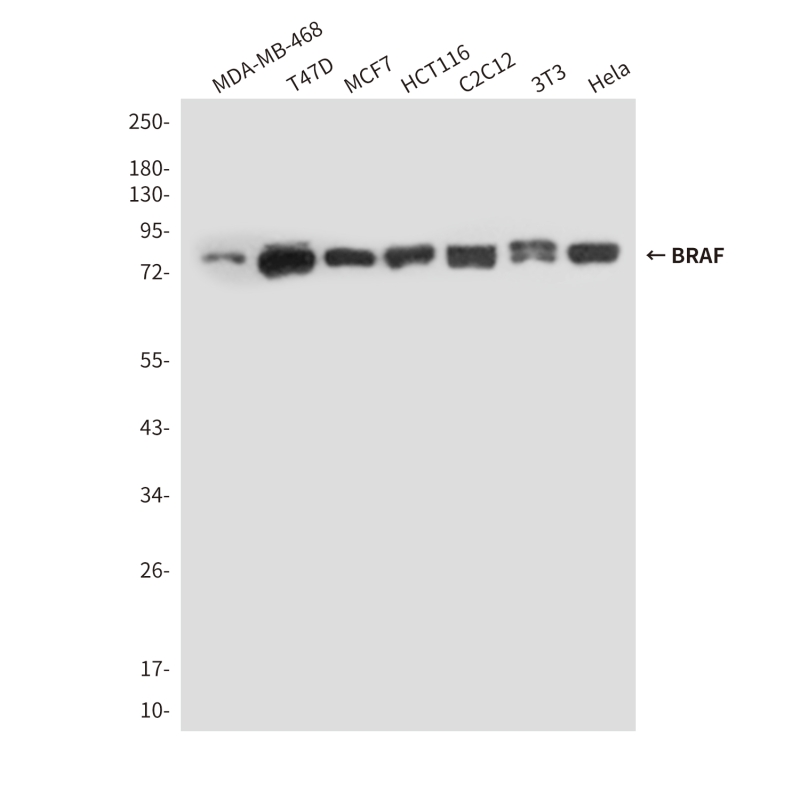
| WB | 咨询技术 | Human,Mouse,Rat |
| IF | 咨询技术 | Human,Mouse,Rat |
| IHC | 咨询技术 | Human,Mouse,Rat |
| ICC | 技术咨询 | Human,Mouse,Rat |
| FCM | 咨询技术 | Human,Mouse,Rat |
| Elisa | 咨询技术 | Human,Mouse,Rat |
| Aliases | BRAF; BRAF1; RAFB1; Serine/threonine-protein kinase B-raf; Proto-oncogene B-Raf; p94; v-Raf murine sarcoma viral oncogene homolog B1 |
| Entrez GeneID | 673 |
| clone | 7B10 |
| WB Predicted band size | Calculated MW: 84 kDa; Observed MW: 87 kDa |
| Host/Isotype | Mouse IgG2a |
| Antibody Type | Primary antibody |
| Storage | Store at 4°C short term. Aliquot and store at -20°C long term. Avoid freeze/thaw cycles. |
| Species Reactivity | Human,Mouse |
| Immunogen | Purified recombinant human B Raf protein fragments expressed in E.coli. |
| Formulation | Purified antibody in PBS with 0.05% sodium azide,0.5%BSA and 50% glycerol. |
+ +
以下是关于BRAF抗体的3篇参考文献及其摘要概述:
---
1. **文献名称**:*Immunohistochemistry with the anti-BRAF V600E (VE1) antibody: A systematic review and meta-analysis*
**作者**:Capper D, Preusser M, Habel A, et al.
**摘要**:该研究系统评价了使用VE1抗体通过免疫组化(IHC)检测BRAF V600E突变的准确性。结果表明,VE1抗体在多种肿瘤(如黑色素瘤、甲状腺癌和结直肠癌)中具有高灵敏度和特异性,可作为传统分子检测的替代或补充方法。
---
2. **文献名称**:*BRAF mutations in hairy cell leukemia and the VE1 antibody: Diagnostic utility and limitations*
**作者**:Tiacci E, Schiavoni G, Forconi F, et al.
**摘要**:本研究探讨了VE1抗体在毛细胞白血病(HCL)中检测BRAF V600E突变的适用性。结果显示,VE1抗体在HCL中高度敏感,但在其他BRAF突变类型或罕见变异中可能存在局限性,需结合测序验证。
---
3. **文献名称**:*Detection of BRAF V600E mutations in melanoma by immunohistochemistry has good interobserver reproducibility*
**作者**:Long GV, Wilmott JS, Capper D, et al.
**摘要**:该研究评估了不同病理学家使用VE1抗体检测黑色素瘤中BRAF V600E突变的一致性。结果显示,IHC检测具有较高的可重复性,且与PCR结果高度一致,支持其作为临床常规诊断工具的应用。
---
**备注**:若您需要关于BRAF **抑制剂**(如维莫非尼、达拉非尼)的文献,可补充提供相关治疗研究(如临床试验或耐药机制方向)。
The BRAF protein, a member of the RAF kinase family, plays a critical role in the MAPK/ERK signaling pathway, which regulates cell growth, proliferation, and survival. Mutations in the BRAF gene, particularly the V600E substitution, are implicated in various cancers, including melanoma, colorectal cancer, and papillary thyroid carcinoma. These mutations lead to constitutive activation of the kinase, driving uncontrolled cellular division and tumor progression.
BRAF antibodies are essential tools in both research and clinical diagnostics. In research, they help detect BRAF expression levels, phosphorylation status, and mutation presence, aiding in mechanistic studies of oncogenesis. Clinically, BRAF-specific antibodies are used in immunohistochemistry (IHC) to identify BRAF V600E mutations in tumor samples, enabling rapid and cost-effective diagnosis. This is particularly valuable for guiding targeted therapies, such as BRAF inhibitors (e.g., vemurafenib, dabrafenib) or combination therapies with MEK inhibitors, which show efficacy in BRAF-mutated cancers.
Additionally, BRAF antibodies contribute to the development of companion diagnostics, ensuring patient stratification for precision medicine. Recent advancements explore their therapeutic potential, including antibody-drug conjugates (ADCs) or immune checkpoint modulation. However, challenges persist, such as antibody specificity across BRAF isoforms and resistance mechanisms in targeted therapies. Ongoing research aims to optimize BRAF antibody applications, enhancing diagnostic accuracy and expanding treatment options for BRAF-driven malignancies.
×